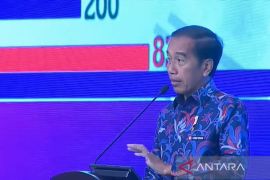In an effort to increase the countrys economic resilience, the government is developing and empowering SMEs by providing them with a low interest rate through its micro-economic loan program (KUR).
The government has lowered the interest rate of KUR for SMEs from 22 percent to 9.0 percent in order to empower small businesses in the country, Minister of Cooperatives and Small-scale Businesses Anak Agung Gusti Ngurah Puspayoga said.
"The government, through the Ministry of Cooperatives and Small-scale Businesses, will further cut the KUR rate for SMEs from the current 9.0 percent to 7.0 percent in 2017," Minister Puspayoga said in Ngawi, East Java, last weekend (February 19).
The lowering of the KUR credit interest rate is part of the government efforts to support small businesses and to take side with them, he said. "The reduction of the KUR credit interest rate to 7.0 percent indicates the governments trust for SMEs. It is a form of the governments care for SMEs because they are an important part of the countrys economy," the minister noted.
The government has gradually cut the KUR credit rates from 22 percent to 12 percent and now to 9.0 percent. For next year, it will further lower it to 7.0 percent. This all is expected to empower and increase the production capacity of SMEs, he said.
"If SMEs develop well, they have the potential to absorb a lot of workers. Therefore, the lowering of the interest rate for small businesses constitutes a concrete step by the government to reduce the poverty rate," the minister remarked.
For this purpose, Minister Puspayoga has asked KUR credit distributor banks to work optimally in extending the KUR credits to recipients. The Ministry of Cooperatives and Small-scale Businesses has set a target to provide KUR credits worth Rp100 trillion to SMEs this year.
The distributor banks included Bank BRI with a target to extend Rp67.5 trillion KUR credits, Bank Mandiri (Rp13 trillion) and Bank BNI (Rp11.5 trillion). Besides, the KUR credits are also to be channeled by regional government-owned banks and cooperatives.
The government has increased the number of distributor banks from seven to 19, according to Braman Setyo, deputy minister for financing affairs of the Ministry of Cooperatives and Small-scale Business.
"The Committee on KUR Policy has decided in a meeting that the number of distributor banks will be increased from 12 to 19 KUR," the deputy minister stated in Solo, Central Java, last week (February 18).
The seven banks which have been assigned are Bank BRI, Bank Mandiri, Bank BNI, and BPD Kalbar of West Kalimtan, in addition to BPD NTT of East Nusa Tenggara, Bank Baybank and Bank Sinarmas, he said.
However, he did not mention the other 12 distributors that had also been assigned to channel the KUR credits.
Of the Rp100 trillion KUR credit target, some Rp10.89 trillion has been channeled in the period between January 4 and mid-February 2016, Braman Setyo said. The amount was provided for 492,380 KUR customers. In the KUR credit scheme, the government has provided an interest subsidy of Rp10.5 trillion.
Through the interest rate subsidy, small businesses are expected to increase and improve their products so that they will be able to compete in the free market of the AEC and help spur economic growth and offer more job opportunities.
The government should continue to empower SMEs as one of the countrys economic pillars in the face of the AEC, the Indonesian Chamber of Commerce and Industry (Kadin) said.
"The growth of SMEs as economic pillars has been able to safeguard the national economy each time it is facing downturns," HM Hasan, the deputy chairman of the Kadin, said in Tangerang, Banten, recently.
Therefore, Indonesian small businesses are ready to face competition in the ACE era, Kadin believes.
At a time when a number of large companies shut down their business in the country, the SMEs can grow even better because they are not affected significantly by the global economic slow-down, he said.
Therefore, the Kadin through a number of programs is encouraging the development of SMEs in all regions in the country because they can open chances for new business opportunities, he said.
With small capital or even with a joint endeavor, the business they are doing will develop as they will also be assisted by the regional governments. "SMEs which obtain assistance are usually those which have been running. Therefore, SMEs should better not ask for capital immediately but develop their capability and skills first," Hasan said.
A successful business usually starts with various failures before making progress after knowing causes of the failures. Therefore, small business players should not be discouraged when their businesses do not develop, he said. For example, one of the best solutions is to communicate with other SMEs so that they could be helped with regard to marketing, he said.
"SMEs should develop a discussion forum that could facilitate their efforts to promote their products, even overseas," he said. (*)
Reporter: Andi Abdussalam
Editor: Heru Purwanto
Copyright © ANTARA 2016











